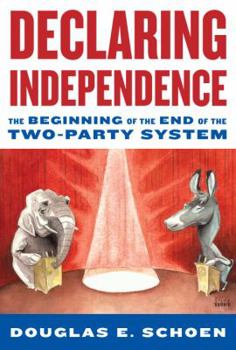Declaring Independence: The Beginning of the End of the Two-Party System
A 2006 survey revealed that two thirds of Americans consider themselves "dissatisfied with the way things are going in the U.S." In recent polls, 60 to 80 percent of registered voters say they want an... This description may be from another edition of this product.
Format:Hardcover
Language:English
ISBN:1400067332
ISBN13:9781400067336
Release Date:February 2008
Publisher:Random House (NY)
Length:240 Pages
Weight:0.76 lbs.
Dimensions:1.0" x 6.4" x 8.0"
Customer Reviews
1 rating
Timely, Informative, Provocative, and Insightful
Published by Thriftbooks.com User , 16 years ago
Douglas Schoen argues, in his book "Declaring Independence," that the two-party system in American politics is breaking down and I couldn't agree with him more. He suggests that the time is ripe for a third political party which has real clout and a real chance to win the White House. Again, I completely agree. Furthermore, Schoen cites statistics that show more and more American voters are leaving the Democrat and Republican parties and declaring themselves to be "Independents." I have seen that happening myself among my own friends and acquaintances. Call it Synchronicity or just plain coincidence, but it was only seven or eight months ago that I was discussing the field of candidates for the presidential race in 2008 with some of my fellow political junkies and I made the (at the time) bold remark that "if there was ever a time for a third-party candidate to make a successful run for the White House, 2008 could be that year because of the polarization of political thought in this country by the politicians themselves and the widespread dissatisfaction with the performance of both major political parties." I did not know that others were thinking along the same lines. I'm pleased to see that my proposition has been somewhat validated by a political professional such as Douglas Schoen. I don't feel like a such a "kook" now. I left the Republican party myself many years ago and refused to join any other party simply because of what I perceived to be a failure of a principled response to the major issues I saw impacting our society. I could not determine a real difference between the Democrats and the Republicans when it came to actually "doing" something as opposed to simply "talking" about it. From that time on, I guess I looked on myself as an "Independent," but without an independent party to join. As close as I came during one election cycle was to think about signing up with the Libertarian party because I was impressed with its candidates at the time. Schoen informs us that independent voters now constitute the largest group of the electorate, so I don't feel so alone now. I'm finally the member of some majority for once! This book provides the reader with an excellent general background of the third-party movements which have occurred in our history and why most of them failed. He also provides an excellent overview of the problems which any third party is going to face, including the very serious problem of getting on the ballot in the first place (and the shameful practices of both major parties in trying to prevent ballot access to other parties). The author also provides the reader with extremely helpful charts and graphs to illustrate the statistics relevant to his topic. I think one of the most valuable chapters in the book deals with the role of the Internet in national elections and the possibilities it presents for third-party enhancement. The growth of so-called "social networking" on the Web, as well as the development o





